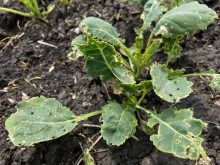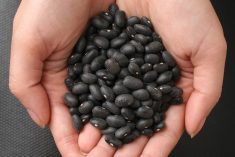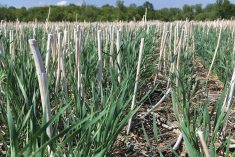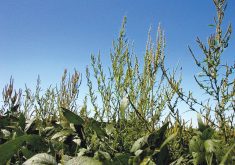The Keystone Agricultural Producers’ (KAP) meeting room was chilly, then Starbuck farmer Ed Rempel explained why.
“Well Mr. Chairman, I think hell just froze over because I agree with everything Butch Harder just said.”
The room erupted with laughter.
Harder, a KAP District 3 representative who farms at Lowe Farm, had just told KAP’s fall advisory council meeting here Nov. 2 of concerns he and other farmers had raised at their local KAP district meeting regarding five Manitoba commodity groups working towards a merger.
Read Also

CUSMA access key among other trade noise: Seeds Canada panel
Seeds Canada conference panelists say Canada needs to stay focused and wait as U.S. trade and tariff chaos develops, and a Canada-U.S.-Mexico Agreement review looms
“We understand why some of the groups want to join because they are short of money, but we think that eventually this will lead to less farmer representation on these groups,” Harder said.
Earlier that day the five groups — Manitoba Wheat and Barley Growers, Manitoba Flax Growers, the National Sunflower Association of Canada, Manitoba Corn Growers and Manitoba Pulse & Soybean Growers — issued a news release updating their merger discussions. A comprehensive member consultation plan has been developed and a summary report will be released to get farmers’ feedback in December.
The directors of existing commodity associations are already overloaded, Harder said. Expecting directors to know about and represent five different crops would be time consuming, he said, hinting it could be a full-time job.
“You ain’t going to be farming,” Harder said. “You just can’t do it. And I am concerned that we are watering down these organizations eventually to just less farmer representation…
“I see absolutely nothing wrong with collaboration. In fact, I think it would be a good idea for those groups to get together, once a year for two days to talk about what they’re doing.”
Rempel agreed merging would put a strain on farmer-directors.
“I think we’re going to lose our voice pretty badly,” Rempel said.
While some farmers complain of checkoff fatigue, having one organization instead of five will make it simpler for farmers to seek checkoff refunds, he said.
“And quite frankly that scares the dickens out of me Mr. Chairman,” Rempel said. “All these different commodity groups require money to operate. And they all do very, very good work.
“And that board of directors, as I think Butch said, you’re going to be pretty much full time. You’re going to have to be a professional board of director. So Butch, thank you very much for your comments. I think you’re dead on.”
Support too
Holland farmer and KAP District 2 director Les Ferris says merging makes sense because there are fewer farmers available to serve on boards.
“Merging organizations will streamline things,” he said in an interview following the meeting.
Most farmers grow all the commodities represented so they have some familiarity with them, he added.
The five groups signed a memorandum of understanding in the spring, agreeing to explore merging to serve farms better and save them money. Since then a working group, consisting of staff representatives, has met regularly to develop questions for the steering committee, made up of board and staff representatives, as well as develop a consultation plan that ensures this process remains driven by Manitoba’s farmers, the groups said in their release.
“The report (on merging) will include information on board/governance structure of the new, combined organization, a potential operations structure as well as a list of farmer benefits, which includes improved agricultural research, improved innovation and increased member value for Manitoba growers producing the represented crops,” the release says.
The steering committee met with Agriculture Minister Ralph Eichler in September to brief him on the process.
“The committee was met with optimism and enthusiasm over the project,” the release says
“Working together to reduce overlap, increase efficiencies and increase research and agronomy capacity is consistent with the province’s commitment to reducing red tape and improving agricultural research and innovation.”
Transparent process
The groups have been open about the process and have, and continue to encourage farmer feedback, Pam de Rocquigny, general manager of the Manitoba Wheat and Barley Growers Association and Manitoba Corn Growers Association, said on the sidelines of the KAP meeting.
“(The report will be) kind of a road map as to how we see this potentially happening,” she said. “But then again, that’s part of the consultation process — for members to say ‘that makes sense, did you think about this?’ and maybe we hadn’t thought about that.”
Consultant Rob Hannam, with Synthesis Agri-Food Network, who has been working with the groups on developing a merger plan, and the working group, will meet with interested farmers to discuss the plan at St. Jean Farm Days and at Ag Days, Jan. 10 and 16, respectively.
Similar meetings will be held in Stonewall and Dauphin before year’s end. Dates, times and locations will be announced later.
Farmers are being urged to provide input, including when the groups hold their annual meetings during CropConnect at the Victoria Inn and Convention Centre in Winnipeg in February, de Rocquigny said.
Farmers can also submit ideas or ask questions by emailing Rob Hannam at [email protected] or contacting directors of the five groups.




















